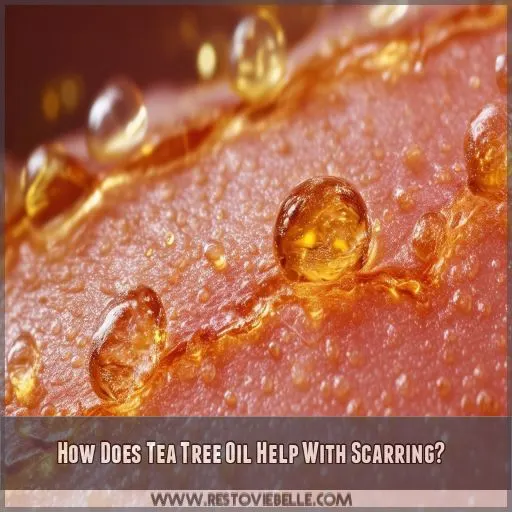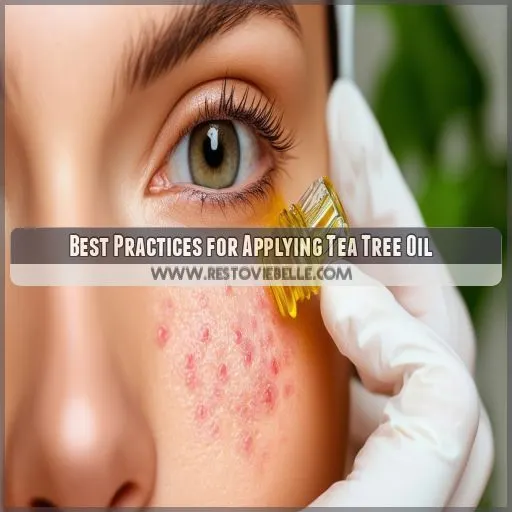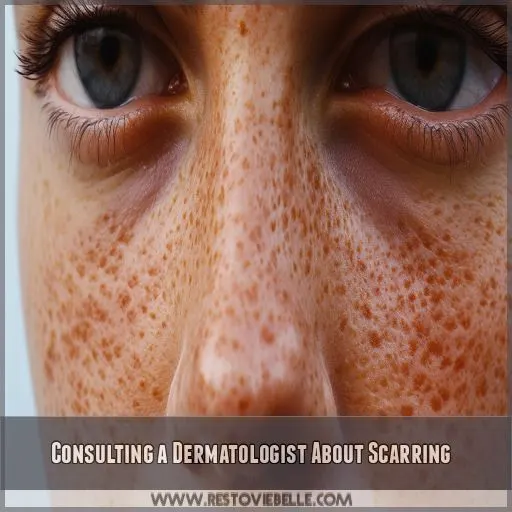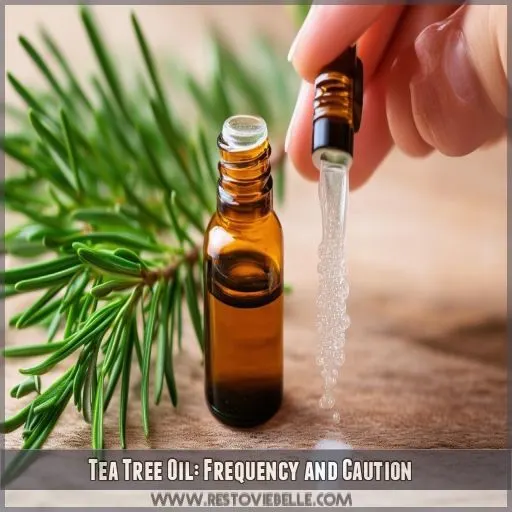This site is supported by our readers. We may earn a commission, at no cost to you, if you purchase through links.
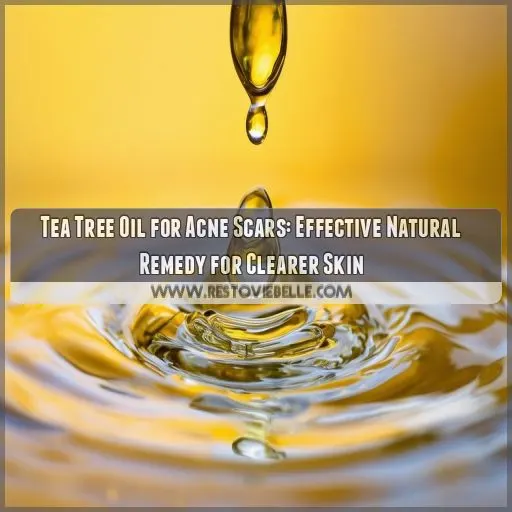 Acne scars can be literally a nightmare, at worst. With tea tree oil, though, you are promised a natural potent solution in your hands. This fantastic property of this Australian essential oil is just perfect for the kind of clearer skin that you are seeking.
Acne scars can be literally a nightmare, at worst. With tea tree oil, though, you are promised a natural potent solution in your hands. This fantastic property of this Australian essential oil is just perfect for the kind of clearer skin that you are seeking.
You’ll discover exactly how tea tree oil fights scarring, proper techniques for application, and explore DIY treatments. While it won’t work miracles, many people have reported tea tree oil as helping in the reduction of acne scars.
We’ll guide you through using this natural remedy safely and effectively, empowering you to take control of your skin’s health.
Table Of Contents
- Key Takeaways
- Tea Tree Oil for Acne Scars
- How Does Tea Tree Oil Help With Scarring?
- Antiseptic Properties of Tea Tree Oil
- Best Practices for Applying Tea Tree Oil
- Tea Tree Oil in Home Remedies for Scarring
- Consulting a Dermatologist About Scarring
- Properties of Tea Tree Oil and Scarring
- Human Studies on Tea Tree Oil for Scarring
- Safety Considerations for Using Tea Tree Oil on Scars
- Tea Tree Oil: Frequency and Caution
- Frequently Asked Questions (FAQs)
- Does tea tree oil get rid of acne scars?
- How long does tea tree oil take to work on scars?
- Which oil is best for removing acne scars?
- Can I apply tea tree oil directly on acne?
- Can tea tree oil fade old acne scars?
- How long does it take to see results?
- Is tea tree oil effective for deep, pitted scars?
- Can tea tree oil be combined with other scar treatments?
- Are there any alternatives to tea tree oil for scars?
- Conclusion
Key Takeaways
- Tea tree oil isn’t a magic wand for acne scars, but it’s like a trusty sidekick in your skincare arsenal. Its antiseptic and anti-inflammatory properties can help fade those pesky reminders of breakouts past.
- Safety first, folks! Always dilute tea tree oil with a carrier oil and do a patch test. You don’t want to go from acne scars to "I accidentally turned myself into a tomato" face.
- Get creative with your acne-fighting concoctions! Mix tea tree oil into clay masks, facial scrubs, or overnight treatments. It’s like being a skincare alchemist, minus the pointy hat and bubbling cauldron.
- Patience is key, young grasshopper. Results typically take 4-8 weeks of consistent use. Rome wasn’t built in a day, and neither is flawless skin. Stick with it, and you might just be pleasantly surprised!
Tea Tree Oil for Acne Scars
Interestingly, acne scars can be put at bay with a little help from tea tree oil. One of the strongest essential oils that have gained recent popularity in the treatment of problems related to skin conditions like acne scars is tea tree oil. While surely not some kind of magic fix, many people swear to its effectiveness in fading scarring.
Before you dive in, remember safety first. Always dilute tea tree oil in a carrier oil and do a patch test to avoid skin irritation. It isn’t recommended for popped pimples, so let those heal first.
With its anti-inflammatory features, tea tree oil has the potential to reduce acne inflammation; in effect, this might serve to prevent the formation of new scars.
As much as home remedies may be tempting, one should always take care when venturing into skincare. In case of hesitation, always consult a dermatologist to be certain you’re using tea tree oil safely and efficiently on your particular skin.
How Does Tea Tree Oil Help With Scarring?
Tea tree oil can be your secret weapon against acne scars. This powerhouse natural remedy works wonders for your skin in multiple ways. Here’s how it helps with scarring:
- It’s like a gentle eraser, slowly fading those stubborn marks
- It acts as a skin whisperer, encouraging your cells to regenerate faster
- It’s a peacemaker, calming inflammation and redness in your skin
Tea tree oil’s anti-inflammatory properties are key in reducing the appearance of scars. It tackles hyperpigmentation head-on, helping to even out your skin tone. By promoting skin regeneration, it speeds up the healing process, giving you clearer skin sooner. When you use tea tree oil for acne scars, you’re not just treating the surface – you’re giving your skin the tools it needs to heal itself from within. It’s like having a tiny skin superhero in a bottle!
Antiseptic Properties of Tea Tree Oil
Tea tree oil’s antiseptic properties make it a powerful ally in your fight against acne scars. This natural wonder doesn’t just help with scarring; it’s a multitasking marvel. Its antimicrobial properties work to keep your skin clean and clear, preventing further breakouts that could lead to more scars.
Here’s a quick look at how tea tree oil tackles different skin issues:
| Skin Issue | Tea Tree Oil Effect |
|---|---|
| Bacteria | Kills harmful microbes |
| Inflammation | Reduces redness and swelling |
| Wound Healing | Promotes faster recovery |
| Scarring | May help fade existing marks |
Best Practices for Applying Tea Tree Oil
To apply tea tree oil effectively for acne scars, you’ll need to follow some key practices. Start by combining the oil with a carrier oil, perform a patch test, cleanse and dry your skin thoroughly, and use proper application techniques for best results.
Combining With Carrier Oils
You might’ve read that tea tree oil has antiseptic properties, but remember that it’s important to dilute the stuff when applying it on the skin.
Carrier oils will really help out here. They ensure that tea tree oil spreads well and, at the same time, reduces the risk of irritation. Such oils include popular jojoba oil, coconut oil, and almond oil.
Mix 2-3 drops with one teaspoon of carrier oil to come up with a 2-3% concentration.
Patch Testing
Mixing is done by adding the tea tree oil to the carrier oil.
A patch test is quite important. Place a small amount of the diluted mixture onto an area of your body with sensitive skin, like on your inner arm. Keep it there for 24 hours to check for reactions, redness, or itchiness.
This is because tea tree oil could prove to be one of those oils that are known to result in sensitivity in some people. Don’t skip this precaution!
Cleansing and Drying Skin
You have to prepare your skin before applying the tea tree oil. Cautiously clean your face with a very mild, non-irritating cleanser. After that, pat your skin dry with a clean towel—no rubbing, as that will irritate your skin.
Remember that well-moisturized skin absorbs products much better, so yes, you may apply a little bit of moisturizer. Always patch test first for reactions.
All in all, this is preparation time for the skin to ensure good application of the tea tree oil.
Application Techniques
Now, wash and dry your skin, then apply the tea tree oil. Always remember the proper ways of application.
Always dilute it with some carrier oils—jojoba or coconut oil, for that matter—with a 1:1 ratio. Do patch testing first to avoid allergic reactions.
Then gently dab these mixtures onto the scars using a cotton swab. Again, don’t overdo things; a little goes a long way in skincare.
Tea Tree Oil in Home Remedies for Scarring
Tea tree oil can be incorporated into various home remedies to help with acne scarring. You can try using it in clay masks, facial scrubs, overnight masks, or black charcoal peelable masks for potential benefits to your skin.
Clay Masks
Clay masks can be a game-changer for acne scars when combined with tea tree oil. The clay’s texture draws out impurities while tea tree oil works its magic. Here’s why you’ll love this combo:
- Absorbs excess oil and unclogs pores
- Reduces inflammation and redness
- Smooths skin texture over time
- Provides a deep cleanse for your face
- Boosts skin’s natural healing process
Different clay types offer unique benefits, so experiment to find your perfect match. Remember, consistency is key for seeing results!
Facial Scrubs
You can create effective facial scrubs with tea tree oil to combat acne scars.
Mix rice flour with a few drops of diluted tea tree oil for a natural exfoliant. Gently massage this homemade scrub onto your skin using circular motions.
The exfoliation techniques help remove dead skin cells, while the tea tree oil concentration works to reduce scarring.
Remember to use gentle pressure and avoid over-scrubbing to prevent irritation.
Overnight Masks
Moving from facial scrubs to overnight masks, you’ll find another effective way to harness tea tree oil’s benefits. Combine it with aloe vera and coconut oil for a soothing, acne-fighting mask.
The oil’s effectiveness shines during sleep, allowing ample time for absorption. Be mindful of skin sensitivity when choosing mask ingredients.
This home remedy can work wonders, but remember, results may vary. Stick with it for best results!
Black Charcoal Peelable Masks
Another powerful home remedy for acne scars combines the benefits of tea tree oil with charcoal masks. These peelable black charcoal masks can help draw out impurities and excess oil from your skin.
When mixed with tea tree oil, they create a potent blend that may reduce scarring.
The charcoal benefits include deep cleansing and exfoliation, while tea tree oil adds its antiseptic properties to the mix.
Consulting a Dermatologist About Scarring
While the tea tree oil is very effective in acne scars, it’s always advisable to consult a dermatologist, especially if you have severe scarring. A professional dealing with issues of the skin will examine your situation and give proper topical advice. Here’s why you need to consult a professional:
- They’ll assess the extent of your scarring and your skin type.
- You’ll get all the personalized recommendations by a dermatologist.
- Development of a treatment plan: They can help you develop an all-inclusive treatment plan.
Your dermatologist may further advise applying the tea tree oil along with other treatments. This obviously will be based on variables like sensitive skin and individual nature of scarring. After all, what works for your best friend mightn’t work for you – everybody’s skin is different. You aren’t just treating your scars; by professional advice, you’re investing in long-term skin health. So don’t be shy – book that appointment and begin your way toward clearer, healthier skin!
Properties of Tea Tree Oil and Scarring
It is always important to seek out a dermatologist, but educating yourself will help in knowing what exactly you’re putting into your skin. Among the powerhouse essential oils is tea tree oil, with its impressive array of benefits against acne scars: enriched with antioxidants to fight free radicals and reduce the outward appearances of those scars, and anti-inflammatory to calm redness and irritation that shall make scars less noticeable.
Tea tree oil, by its very nature of being a healing ingredient, might also enhance skin cell regeneration and encourage the fading of scars. This requires proper concentration and dilution to avoid skin irritation. You’ll want to start with a low concentration, typically 5% or less, mixed with a carrier oil like jojoba or coconut oil.
Human Studies on Tea Tree Oil for Scarring
While tea tree oil shows promise for acne scars, human studies specifically focused on scarring are limited. Most research has centered on its effects on active acne, with fewer long-term studies examining scar reduction. This gap in scientific consensus makes it challenging to determine the ideal dosage or application frequency for scar treatment.
However, some studies suggest that tea tree oil’s anti-inflammatory properties may help reduce the appearance of scars over time. It’s worth noting that combination treatments, such as using tea tree oil alongside other natural remedies or conventional therapies, might yield better results.
Keep in mind that individual responses can vary, and what works for one person may not work for another. As research progresses, we’ll gain a clearer picture of tea tree oil’s effectiveness for acne scars, but for now, it’s best to approach it as a potentially helpful complementary treatment.
Safety Considerations for Using Tea Tree Oil on Scars
While using tea tree oil for acne scars, safety has to be kept in mind by proper dilution and patch testing. One should always dilute the tea tree oil in a career oil and do a patch test on some small area of the skin to check for any allergic reaction before applying it to larger areas of the body.
Proper Dilution Ratios
Though promising, tea tree oil for acne scars has to be properly diluted. You should be considering:
- The sensitivity of your skin
- Oil concentration
- Carrier oil of your choice
Mix 1-2 drops of tea tree oil with a tablespoon of jojoba or coconut oil. Begin with the lower concentration and increase if needed. Keep in mind that more is less—it may harm skin when applied excessively.
Patch Testing Importance
While proper dilution is important, it can’t be overemphasized that patch testing should always be performed first.
Do a patch test before you apply the tea tree oil to your scars—even if you don’t suspect an allergy—to screen for allergic potential.
It’s really fairly simple: Just apply a tiny amount of diluted oil to an inconspicuous area of skin and wait 24 hours. If in that time period there isn’t any irritation, then you’re probably all right.
This extra step could save you from unwanted reactions.
Potential Allergic Reactions
Tea tree oil can be beneficial for acne scars, but it’s not without risks.
You might experience skin irritation or allergic reactions, especially if you have sensitive skin.
To stay safe, always do a patch test and properly dilute the oil. If you notice redness, itching, or swelling, stop using it immediately.
Tea Tree Oil: Frequency and Caution
However, balance is needed when applying tea tree oil for acne scars; while you’d like to apply it regularly, you wouldn’t want to overdo it. Apply once or twice a day, depending on how much your skin is able to stand. Remember, more isn’t always better!
For many people, this essential oil induces an allergic reaction or side effects, so start with applying small amounts and observe how your skin reacts. Always dilute it in some carrier oil first, for less irritation, and always try a patch test before applying it all over. If there’s any kind of redness, itching, or swelling, then the use should be stopped.
Everybody may have a different response to tea tree essential oil, and what might work wonders for many might not work for some. Listen to your skin, and don’t hesitate to consult a dermatologist in case of any doubt about safe use or just normal concern. Your skin’s health is worth the extra precaution!
Frequently Asked Questions (FAQs)
Does tea tree oil get rid of acne scars?
While tea tree oil can help with active acne, it’s not a proven solution for acne scars. You might see some improvement in skin texture and tone, but for significant scar reduction, you’ll need more targeted treatments.
How long does tea tree oil take to work on scars?
You’ve been diligently applying tea tree oil, but results aren’t instant. While individual experiences vary, it typically takes 4-8 weeks of consistent use to see noticeable improvements in scar appearance. Patience and persistence are key to success.
Which oil is best for removing acne scars?
While there’s no single "best" oil, rosehip and jojoba oils are excellent for fading acne scars. They’re rich in vitamins and fatty acids that promote skin healing. Consistency is key – you’ll need patience to see results.
Can I apply tea tree oil directly on acne?
Don’t apply tea tree oil directly on acne. It’s too strong and can irritate your skin. Instead, dilute it with a carrier oil or moisturizer. Always do a patch test first to check for any adverse reactions.
Can tea tree oil fade old acne scars?
Like a gentle eraser, tea tree oil can help fade old acne scars. Its anti-inflammatory properties may reduce redness and promote healing. While it’s not a miracle cure, consistent use can improve skin texture and appearance over time.
How long does it take to see results?
You’ll typically notice improvements in 4-6 weeks with consistent use. However, results vary based on scar severity and your skin type. Remember, patience is key – stick with your routine and you’ll likely see gradual fading over time.
Is tea tree oil effective for deep, pitted scars?
Picture a deep canyon in your skin. Tea tree oil isn’t your bridge across it. While it’s great for active acne, it’s not effective for deep, pitted scars. You’ll need professional treatments for those stubborn reminders.
Can tea tree oil be combined with other scar treatments?
You can combine tea tree oil with other scar treatments for enhanced results. Mix it with vitamin E oil, rosehip oil, or aloe vera gel. Always patch test and consult a dermatologist before trying new combinations on your skin.
Are there any alternatives to tea tree oil for scars?
You’ve got options! Try vitamin C serum, rosehip oil, or aloe vera for scars. Retinoids can also help. Don’t forget sunscreen to prevent further damage. Remember, consistency’s key – give treatments time to work their magic.
Conclusion
Well, acne scars are kind of like battle wounds to your skin; therefore, the tea tree oil works like a balm. In this article, you learned about its antiseptic properties and modes of application or DIY remedies.
Though not a miracle cure, tea tree oil for acne scars can be an effective natural solution if used correctly: always dilute, test on a patch, and if need be, consult a dermatologist.
With patience and continued application, you’ll find this Australian oil extracted from the plant to be a treasured companion against skin troubles and towards clearer and more confident skin.

